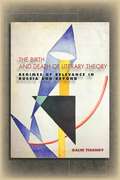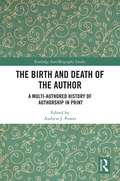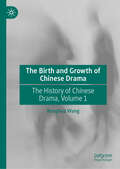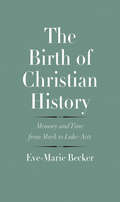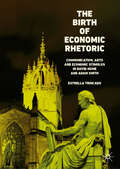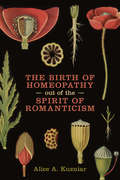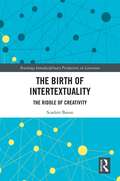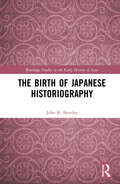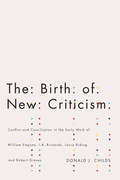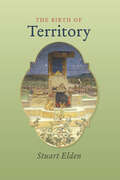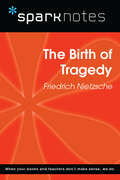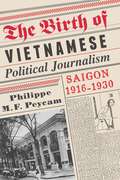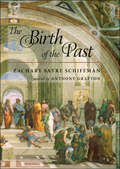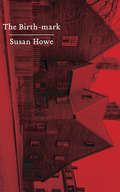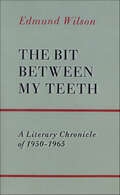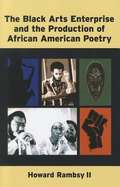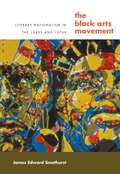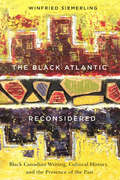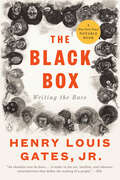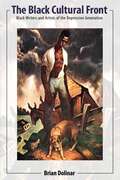- Table View
- List View
The Birth and Death of Literary Theory: Regimes of Relevance in Russia and Beyond
by Galin TihanovUntil the 1940s, when awareness of Russian Formalism began to spread, literary theory remained almost exclusively a Russian and Eastern European invention. The Birth and Death of Literary Theory tells the story of literary theory by focusing on its formative interwar decades in Russia. Nowhere else did literary theory emerge and peak so early, even as it shared space with other modes of reflection on literature. A comprehensive account of every important Russian trend between the world wars, the book traces their wider impact in the West during the 20th and 21st centuries. Ranging from Formalism and Bakhtin to the legacy of classic literary theory in our post-deconstruction, world literature era, Galin Tihanov provides answers to two fundamental questions: What does it mean to think about literature theoretically, and what happens to literary theory when this option is no longer available? Asserting radical historicity, he offers a time-limited way of reflecting upon literature—not in order to write theory's obituary but to examine its continuous presence across successive regimes of relevance. Engaging and insightful, this is a book for anyone interested in theory's origins and in what has happened since its demise.
The Birth and Death of the Author: A Multi-Authored History of Authorship in Print (Routledge Auto/Biography Studies)
by Andrew J. PowerThe Birth and Death of the Author is a work about the changing nature of authorship as a concept. In eight specialist interventions by a diverse group of the finest international scholars it tells a history of print authorship in a set of author case studies from the fifteenth to the twenty-first century. The introduction surveys the prehistory of print authorship and sets the historical and theoretical framework that opens the discussion for the seven succeeding chapters. Engaging particularly with the history of the materials and technology of authorship it places this in conversation with the critical history of the author up to and beyond the crisis of Barthes' 'Death of the Author'. As a multi-authored history of authorship itself, each subsequent chapter takes a single author or work from every century since the advent of print and focuses in on the relationship between the author and the reader. Thus they explore the complexities of the concept of authorship in the works of Thomas Hoccleve and John Lydgate (Andrew Galloway, Cornell University), William Shakespeare and Christopher Marlowe (Rory Loughnane, University of Kent), John Taylor, "the Water Poet" (Edel Semple, University College Cork), Samuel Richardson (Natasha Simonova, University of Oxford), Herman Mellville (and his reluctant scrivener ‘Bartleby’) (William E. Engel, Sewanee, The University of the South), James Joyce (Brad Tuggle, University of Alabama), and Grant Morrison (Darragh Greene, University College Dublin).
The Birth and Growth of Chinese Drama: The History of Chinese Drama, Volume 1
by Ronghua WangThis is a book of the history of China’s contemporary drama. It provides a panorama of the ups and downs of Chinese drama. It tells how this western art has been adapted to the Chinese context and what it has offered to the world of theatre. It illustrates who the outstanding playwrights are and what great drama they have produced. The book shows how Chinese traditional culture has been blended with this western art form. The book also demonstrates how deeply drama is involve in Chinese politics and daily life.
The Birth of Christian History: Memory and Time from Mark to Luke-Acts
by Eve-Marie BeckerThe first comprehensive account to explore the beginnings of early Christian history writing, tracing its origin to the Gospel of Mark and Luke-Acts When the Gospel writings were first produced, Christian thinking was already cognizant of its relationship to ancient memorial cultures and history-writing traditions. Yet, little has been written about exactly what shaped the development of early Christian literary memory. In this eye-opening new study, Eve-Marie Becker explores the diverse ways in which history was written according to the Hellenistic literary tradition, focusing specifically on the time during which the New Testament writings came into being: from the mid-first century until the early second century CE. While acknowledging cases of historical awareness in other New Testament writings, Becker traces the origins of this historiographical approach to the Gospel of Mark and Luke-Acts. Offering a bold new framework, Becker shows how the earliest Christian writings shaped “Christian” thinking and writing about history.
The Birth of Economic Rhetoric: Communication, Arts and Economic Stimulus in David Hume and Adam Smith
by Estrella TrincadoThis book explores and compares the works of two great economists and philosophers, David Hume and Adam Smith, considering their contributions to language, perception, sympathy, reason, art and theatre to find a general theory of rationality and economics. The author considers and analyses both figures through a range of approaches, and moves on to demonstrate how different concepts of language affect Hume's and Smith's idea of value and economic growth. This book contributes to a wider literature on communication and language to demonstrate that economics is linked to rhetoric and is an essential part of human nature.
The Birth of Homeopathy out of the Spirit of Romanticism
by Alice KuzniarHomeopathy was founded in 1796 by the German physician Samuel Hahnemann who ardently proposed that "like cures like," counter to the conventional treatment of prescribing drugs that have the opposite effect to symptoms. Alice A. Kuzniar critically examines the alternative medical practice of homeopathy within the Romantic culture in which it arose. In The Birth of Homeopathy out of the Spirit of Romanticism, Kuzniar argues that Hahnemann was a product of his time rather than an iconoclast and visionary. It is the first book in English to examine Hahnemann’s unpublished writings, including case journals and self-testings, and links to his contemporaries such as Goethe and Alexander von Humboldt. Kuzniar’s engaging writing style seamlessly weaves together medical, philosophical, semiotic, and literary concerns and reveals homeopathy as a phenomenon of its time. The Birth of Homeopathy out of the Spirit of Romanticism sheds light on issues that continue to dominate the controversy surrounding homeopathy to this very day.
The Birth of Intertextuality: The Riddle of Creativity (Routledge Interdisciplinary Perspectives on Literature)
by Scarlett BaronWhy was the term ‘intertextuality’ coined? Why did its first theorists feel the need to replace or complement those terms – of quotation, allusion, echo, reference, influence, imitation, parody, pastiche, among others – which had previously seemed adequate and sufficient to the description of literary relations? Why, especially in view of the fact that it is still met with resistance, did the new concept achieve such popularity so fast? Why has it retained its currency in spite of its inherent paradoxes? Since 1966, when Kristeva defined every text as a ‘mosaic of quotations’, ‘intertextuality’ has become an all-pervasive catchword in literature and other humanities departments; yet the notion, as commonly used, remains nebulous to the point of meaninglessless. This book seeks to shed light on this thought-provoking but treacherously polyvalent concept by tracing the theory’s core ideas and emblematic images to paradigm shifts in the fields of science, philosophy, psychoanalysis, and linguistics, focusing on the shaping roles of Darwin, Nietzsche, Freud, Saussure, and Bakhtin. In so doing, it elucidates the meaning of one of the most frequently used terms in contemporary criticism, thereby providing a much-needed foundation for clearer discussions of literary relations across the discipline and beyond.
The Birth of Japanese Historiography (Routledge Studies in the Early History of Asia)
by John R. BentleyAs the first book in English on the origins of Japanese historiography, using both archaeological and textual data, this book examines the connection between ancient Japan and the Korean kingdom of Paekche and how tutors from the kingdom of Paekche helped to lay the foundation for a literate culture in Japan. Illustrating how tutors from the kingdom of Paekche taught Chinese writing to the Japanese court through the prism of this highly civilized culture, the book goes on to argue that Paekche tutors guided the early Japanese court through writing, recording family history, and ultimately an early history of the ruling family. As the Japanese began to create their own history, they relied on Paekche histories as a model. Triangulating textual data from Kojiki, Nihon shoki, and Sendai kuji hongi, the author here demonstrates that various aspects of early king genealogies and later events were manipulated. Offering new theories about the Japanese ruling family, it is posited that Emperor Jitō had her committee put Jingū in power, and Suiko on the throne in place of original male rulers to enhance images of strong, female rulers, as she envisioned herself. The Birth of Japanese Historiography will be a valuable resource for students and scholars of Japanese history, historiography, and linguistics.
The Birth of Mankind: Otherwise Named, The Woman's Book (Literary and Scientific Cultures of Early Modernity)
by Thomas RaynaldeBetween 1540 and 1654, The Byrth of Mankynde was a huge commercial success. Offering information on fertility, pregnancy, birth, and infant care, and written in a chatty, colloquial style, it influenced most other literary works of the period bearing on sex, reproduction, and childcare. Until now, this important text has been unavailable except for a microfilm of the 1654 edition. For this new annotated edition of the 1560 version, Elaine Hobby has modernized the spelling and included informative notes. In her critical introduction, she not only traces the development of the book from its German origins, but also shows how early-modern ideas about the reproductive process combined ancient, medieval, and contemporary conceptions. Combining editorial rigour with a concern for the needs of the informed non-specialist, Hobby has made available a text that will be useful to scholars and students in a range of academic disciplines, including literature, history, and women's studies.
The Birth of New Criticism: Conflict and Conciliation in the Early Work of William Empson, I.A. Richards, Laura Riding, and Robert Graves
by Donald J. ChildsAmid competing claims about who first developed the theories and practices that became known as New Criticism - the critical method that rose alongside Modernism - literary historians have generally given the lions share of credit to William Empson and I. A. Richards. In The Birth of New Criticism Donald Childs challenges this consensus and provides a new and authoritative narrative of the movements origins. At the centre stand Robert Graves and Laura Riding, two poet-critics who have been written out of the history of New Criticism. Childs brings to light the long-forgotten early criticism of Graves to detail the ways in which his interpretive methods and ideas evolved into the practice of "close reading," demonstrating that Graves played such a fundamental part in forming both Empsons and Richardss critical thinking that the story of twentieth-century literary criticism must be re-evaluated and re-told. Childs also examines the important influence that Ridings work had on Graves, Empson, and Richards, establishing the importance of this long-neglected thinker and critic. A provocative and cogently argued work, The Birth of New Criticism is both an important intellectual history of the movement and a sharply observed account of the cultural politics of its beginnings and legacy.
The Birth of New Criticism: Conflict and Conciliation in the Early Work of William Empson, I.A. Richards, Robert Graves, and Laura Riding
by Donald J. ChildsAmid competing claims about who first developed the theories and practices that became known as New Criticism - the critical method that rose alongside Modernism - literary historians have generally given the lion's share of credit to William Empson and I.A. Richards. In The Birth of New Criticism Donald Childs challenges this consensus and provides a new and authoritative narrative of the movement's origins. At the centre stand Robert Graves and Laura Riding, two poet-critics who have been written out of the history of New Criticism. Childs brings to light the long-forgotten early criticism of Graves to detail the ways in which his interpretive methods and ideas evolved into the practice of "close reading," demonstrating that Graves played such a fundamental part in forming both Empson's and Richards's critical thinking that the story of twentieth-century literary criticism must be re-evaluated and re-told. Childs also examines the important influence that Riding's work had on Graves, Empson, and Richards, establishing the importance of this long-neglected thinker and critic. A provocative and cogently argued work, The Birth of New Criticism is both an important intellectual history of the movement and a sharply observed account of the cultural politics of its beginnings and legacy.
The Birth of Territory
by Stuart EldenPolitical theory professor Stuart Elden explores the history of land ownership and control from the ancient to the modern world in The Birth of Territory.Territory is one of the central political concepts of the modern world and, indeed, functions as the primary way the world is divided and controlled politically. Yet territory has not received the critical attention afforded to other crucial concepts such as sovereignty, rights, and justice. While territory continues to matter politically, and territorial disputes and arrangements are studied in detail, the concept of territory itself is often neglected today. Where did the idea of exclusive ownership of a portion of the earth’s surface come from, and what kinds of complexities are hidden behind that seemingly straightforward definition? The Birth of Territory provides a detailed account of the emergence of territory within Western political thought. Looking at ancient, medieval, Renaissance, and early modern thought, Stuart Elden examines the evolution of the concept of territory from ancient Greece to the seventeenth century to determine how we arrived at our contemporary understanding. Elden addresses a range of historical, political, and literary texts and practices, as well as a number of key players—historians, poets, philosophers, theologians, and secular political theorists—and in doing so sheds new light on the way the world came to be ordered and how the earth’s surface is divided, controlled, and administered.“The Birth of Territory is an outstanding scholarly achievement . . . a book that already promises to become a ‘classic’ in geography, together with very few others published in the past decades.” —Political Geography“An impressive feat of erudition.” —American Historical Review
The Birth of Tragedy (SparkNotes Philosophy Guide)
by SparkNotesThe Birth of Tragedy (SparkNotes Philosophy Guide) Making the reading experience fun! SparkNotes Philosophy Guides are one-stop guides to the great works of philosophy–masterpieces that stand at the foundations of Western thought. Inside each Philosophy Guide you&’ll find insightful overviews of great philosophical works of the Western world.
The Birth of Vietnamese Political Journalism: Saigon, 1916-1930
by Philippe PeycamPhilippe M. F. Peycam completes the first ever English-language study of Vietnam's emerging political press and its resistance to colonialism. Published in the decade that preceded the Communist Party's founding, this journalistic phenomenon established a space for public, political contestation that fundamentally changed Vietnamese attitudes and the outlook of Southeast Asia. Peycam directly links Saigon's colonial urbanization to the creation of new modes of individual and collective political agency. To better justify their presence, French colonialists implemented a peculiar brand of republican imperialism to encourage the development of a highly controlled print capitalism. Yet the Vietnamese made clever use of this new form of political expression, subverting colonial discourse and putting French rulers on the defensive, while simultaneously stoking Vietnamese aspirations for autonomy. Peycam specifically considers the work of Western-educated Vietnamese journalists who, in their legal writings, called attention to the politics of French rule.Peycam rejects the notion that Communist and nationalist ideologies changed the minds of "alienated" Vietnamese during this period. Rather, he credits colonial urban modernity with shaping the Vietnamese activist-journalist and the role of the French, even at their most coercive, along with the modern public Vietnamese intellectual and his responsibility toward the group. Countering common research on anticolonial nationalism and its assumptions of ethno-cultural homogeneity, Peycam follows the merging of French republican and anarchist traditions with neo-Confucian Vietnamese behavior, giving rise to modern Vietnamese public activism, its autonomy, and its contradictory aspirations. Interweaving biography with archival newspaper and French police sources, he writes from within these journalists' changing political consciousness and their shifting perception of social roles.
The Birth of the Past
by Zachary S. SchiffmanHow we learned to distinguish past from present and see the world historically.Outstanding Academic Title, ChoiceHow did people learn to distinguish between past and present? How did they come to see the past as existing in its own distinctive context? In The Birth of the Past, Zachary Sayre Schiffman explores these questions in his sweeping survey of historical thinking in the Western world. Today we automatically distinguish between past and present, labeling things that appear out of place as "anachronisms." Schiffman shows how this tendency did not always exist and how the past as such was born of a perceived difference between past and present. Schiffman takes readers on a grand tour of historical thinking from antiquity to modernity. He shows how ancient historians could not distinguish between past and present because they conceived of multiple pasts. Christian theologians coalesced these multiple pasts into a single temporal space where past merged with present and future. Renaissance humanists began to disentangle these temporal states in their desire to resurrect classical culture, creating a "living past." French enlighteners killed off this living past when they engendered a form of social scientific thinking that measured the relations between historical entities, thus sustaining the distance between past and present and relegating each culture to its own distinctive context.Featuring a foreword by the eminent historian Anthony Grafton, this fascinating book draws upon a diverse range of sources—ancient histories, medieval theology, Renaissance art, literature, legal thought, and early modern mathematics and social science—to uncover the meaning of the past and its relationship to the present.
The Birth-mark: Essays
by Susan HoweSusan Howe's classic groundbreaking exploration of early American literature. Susan Howe reads our intellectual inheritance as a series of civil wars, where eachtext is a wilderness in which a strange lawless author confronts interpreters, professors, and editors eager for settlement. Howe approaches Anne Hutchinson, Mary Rowlandson, Cotton Mather, Hawthorne, Emerson, Melville and Emily Dickinson as a fellow writer--as a poet and feminist as much as a critic: her insights, fierce and original, are rooted in her seminal textural scholarship in examination of their editorial histories of landmark works. In the process, Howe uproots settled institutionalized roles of men and women as well as of poetry and prose.
The Birthday Party: A Grammar Tales Book to Support Grammar and Language Development in Children (Grammar Tales)
by Jessica HabibPete and Jem get ready for Belle’s birthday, but get stuck trying to blow up balloons. Targeting Subject-Verb sentences, pronouns and the auxiliary ‘be’, this book provides repeated examples of early developing syntax and morphology which will engage and excite the reader while building pre-literacy skills and make learning fun, as well as exposing children to multiple models of the target grammar form. Perfect for a speech and language therapy session, this book is an ideal starting point for targeting client goals and can also be enjoyed at school or home to reinforce what has been taught in the therapy session.
The Bit Between My Teeth: A Literary Chronicle of 1950–1965
by Edmund WilsonThe Bit Between My Teeth: A Literary Chronicle of 1950-1965 collects Edmund Wilson's masterful essays written during a fifteen year span.Originally published in leading periodicals like the New Republic, the New York Review of Books, and the New Yorker, this collection features literary criticism, essays, and reviews by Wilson on F. Scott Fitzgerald, H.L. Mencken, Bernard Shaw, Max Beerbohm, James Branch Cabell, Marquis de Sade, and more.
The Bitter Air of Exile: Russian Writers in the West, 1922-1972
by Simon Karlinsky Alfred AppelThis title is part of UC Press's Voices Revived program, which commemorates University of California Press’s mission to seek out and cultivate the brightest minds and give them voice, reach, and impact. Drawing on a backlist dating to 1893, Voices Revived makes high-quality, peer-reviewed scholarship accessible once again using print-on-demand technology. This title was originally published in 1973.
The Black Arts Enterprise And The Production Of African American Poetry
by Howard RambsyThe outpouring of creative expression known as the Black Arts Movement of the 1960s and 1970s spawned a burgeoning number of black-owned cultural outlets, including publishing houses, performance spaces, and galleries. Central to the movement were its poets, who in concert with editors, visual artists, critics, and fellow writers published a wide range of black verse and advanced new theories and critical approaches for understanding African American literary art. The Black Arts Enterprise and the Production of African American Poetry offers a close examination of the literary culture in which BAM's poets (including Amiri Baraka, Nikki Giovanni, Sonia Sanchez, Larry Neal, Haki Madhubuti, Carolyn Rodgers, and others) operated and of the small presses and literary anthologies that first published the movement's authors. The book also describes the role of the Black Arts Movement in reintroducing readers to poets such as Langston Hughes, Robert Hayden, Margaret Walker, and Phillis Wheatley. Focusing on the material production of Black Arts poetry, the book combines genetic criticism with cultural history to shed new light on the period, its publishing culture, and the writing and editing practices of its participants. Howard Rambsy II demonstrates how significant circulation and format of black poetic texts—not simply their content—were to the formation of an artistic movement. The book goes on to examine other significant influences on the formation of Black Arts discourse, including such factors as an emerging nationalist ideology and figures such as John Coltrane and Malcolm X.
The Black Arts Movement
by James SmethurstEmerging from a matrix of Old Left, black nationalist, and bohemian ideologies and institutions, African American artists and intellectuals in the 1960s coalesced to form the Black Arts Movement, the cultural wing of the Black Power Movement. In this comprehensive analysis, James Smethurst examines the formation of the Black Arts Movement and demonstrates how it deeply influenced the production and reception of literature and art in the United States through its negotiations of the ideological climate of the Cold War, decolonization, and the civil rights movement.Taking a regional approach, Smethurst examines local expressions of the nascent Black Arts Movement, a movement distinctive in its geographical reach and diversity, while always keeping the frame of the larger movement in view. The Black Arts Movement, he argues, fundamentally changed American attitudes about the relationship between popular culture and "high" art and dramatically transformed the landscape of public funding for the arts.
The Black Atlantic Reconsidered
by Winfried SiemerlingReaders are often surprised to learn that black writing in Canada is over two centuries old. Ranging from letters, editorials, sermons, and slave narratives to contemporary novels, plays, poetry, and non-fiction, black Canadian writing represents a rich body of literary and cultural achievement. The Black Atlantic Reconsidered is the first comprehensive work to explore black Canadian literature from its beginnings to the present in the broader context of the black Atlantic world. Winfried Siemerling traces the evolution of black Canadian witnessing and writing from slave testimony in New France and the 1783 "Book of Negroes" through the work of contemporary black Canadian writers including George Elliott Clarke, Austin Clarke, Dionne Brand, David Chariandy, Wayde Compton, Esi Edugyan, Marlene NourbeSe Philip, and Lawrence Hill. Arguing that black writing in Canada is deeply imbricated in a historic transnational network, Siemerling explores the powerful presence of black Canadian history, slavery, and the Underground Railroad, and the black diaspora in the work of these authors. Individual chapters examine the literature that has emerged from Quebec, Nova Scotia, the Prairies, and British Columbia, with attention to writing in both English and French. A major survey of black writing and cultural production, The Black Atlantic Reconsidered brings into focus important works that shed light not only on Canada's literature and history, but on the transatlantic black diaspora and modernity.
The Black Atlantic Reconsidered: Black Canadian Writing, Cultural History, and the Presence of the Past (ISSN)
by Winfried SiemerlingReaders are often surprised to learn that black writing in Canada is over two centuries old. Ranging from letters, editorials, sermons, and slave narratives to contemporary novels, plays, poetry, and non-fiction, black Canadian writing represents a rich body of literary and cultural achievement. The Black Atlantic Reconsidered is the first comprehensive work to explore black Canadian literature from its beginnings to the present in the broader context of the black Atlantic world. Winfried Siemerling traces the evolution of black Canadian witnessing and writing from slave testimony in New France and the 1783 "Book of Negroes" through the work of contemporary black Canadian writers including George Elliott Clarke, Austin Clarke, Dionne Brand, David Chariandy, Wayde Compton, Esi Edugyan, Marlene NourbeSe Philip, and Lawrence Hill. Arguing that black writing in Canada is deeply imbricated in a historic transnational network, Siemerling explores the powerful presence of black Canadian history, slavery, and the Underground Railroad, and the black diaspora in the work of these authors. Individual chapters examine the literature that has emerged from Quebec, Nova Scotia, the Prairies, and British Columbia, with attention to writing in both English and French. A major survey of black writing and cultural production, The Black Atlantic Reconsidered brings into focus important works that shed light not only on Canada's literature and history, but on the transatlantic black diaspora and modernity.
The Black Box: Writing the Race
by Henry Louis Gates Jr.A New York Times Notable Book&“Henry Louis Gates is a national treasure. Here, he returns with an intellectual and at times deeply personal meditation on the hard-fought evolution and the very meaning of African American identity, calling upon our country to transcend its manufactured divisions.&” — Isabel Wilkerson, author of The Warmth of Other Suns and Caste&“This is a literary history of Black America, but it is also an argument that African American history is inextricable from the history of African American literature.&” —The New York TimesA magnificent, foundational reckoning with how Black Americans have used the written word to define and redefine themselves, in resistance to the lies of racism and often in heated disagreement with one another, over the course of the country&’s history.Distilled over many years from Henry Louis Gates, Jr.&’s, legendary Harvard introductory course in African American studies, The Black Box: Writing the Race, is the story of Black self-definition in America through the prism of the writers who have led the way. From Phillis Wheatley and Frederick Douglass, W. E. B. Du Bois and Booker T. Washington, to Zora Neale Hurston and Richard Wright, James Baldwin and Toni Morrison—these writers used words to create a livable world, a home, for Black people destined to live out their lives in a bitterly racist society. It is a book grounded in the beautiful irony that a group formed legally and conceptually by its oppressors to justify brutal subhuman bondage transformed itself through the word into a community joined in overcoming one of history&’s most pernicious lies. Out of that contested ground has flowered a resilient, creative, powerful, diverse culture of people who have often disagreed markedly about what it means to be Black, and about how best to use the past to create a more just and equitable future. This is the epic story of how, through essays and speeches, novels, plays, and poems, a long line of creative thinkers has unveiled the contours of—and resisted confinement in—the black box inside which this nation within a nation has been assigned, willy-nilly, from the nation&’s founding through to today. This is a book that records the compelling saga of the creation of a people.
The Black Cultural Front: Black Writers and Artists of the Depression Generation (Margaret Walker Alexander Series in African American Studies)
by Brian DolinarThe Black Cultural Front describes how the social and political movements that grew out of the Depression facilitated the left turn of several African American artists and writers. The Communist-led John Reed Clubs brought together black and white writers in writing collectives. The Congress of Industrial Organizations's effort to recruit black workers inspired growing interest in the labor movement. One of the most concerted efforts was made by the National Negro Congress (NNC), a coalition of civil rights and labor organizations, which held cultural panels at its national conferences, fought segregation in the culture industries, promoted cultural education, and involved writers and artists in staging mass rallies during World War II.The formation of a black cultural front is examined by looking at the works of poet Langston Hughes, novelist Chester Himes, and cartoonist Ollie Harrington. While none of them were card-carrying members of the Communist Party, they all participated in the Left at one point in their careers. Interestingly, they all turned to creating popular culture in order to reach the black masses who were captivated by the movies, radio, newspapers, and detective novels. There are chapters on the Hughes' "Simple" stories, Himes' detective fiction, and Harrington's "Bootsie" cartoons.Collectively, the experience of these three figures contributes to the story of a "long" movement for African American freedom that flourished during the 1930s, 1940s, and 1950s. Yet this book also stresses the impact that McCarthyism had on dismantling the Black Left and how it affected each individual involved. Each was radicalized at a different moment and for different reasons. Each suffered for their past allegiances, whether fleeing to the haven of the "Black Bank" in Paris, or staying home and facing the House Un-American Activities Committee (HUAC). Yet the lasting influence of the Depression in their work was evident for the rest of their lives.
